PART 2
Here is the Second Installment of our series of 10 Amazing Visionary Artists You've Probably Never Heard of. As a member of the Visionary Community I have had the great privilege of discovering underrepresented artists that are pushing the boundaries of artistic possibility. It is a great honor to bring these creative titans to Steemit and embed them in the blockchain forever. So begins Part 2...
Mars 1
About
Mario Martinez (aka MARS-1) paints from a penetrating perspective of great depth. Viewers are drawn into his imaginative compositions, overflowing with colorful geometric and organic shapes, layered to form unique patterns and textures.
The artist signature style of vast, abstracted, quasi-extraterrestrial looking landscapes feature imagery of surreal distortions, contained within spherically convex transparent bubbles. Skillfully combining optical color blending with perspective line work, his painting techniques result in very three-dimensional forms, which echo the anatomy of architecture, and microcosmic structures of biology.
These 3-D qualities transcend into his sculptural work, as well. Mars-1’s distinctly individual aesthetic is not easily compared to the vision of his contemporaries or artists from past movements. His constantly evolving process continues to expand with each new series of work, seemingly beyond the reaches of even his own awareness.
Themes explored range from very scientific to more esoteric phenomena. From theoretical physics, metamorphosis and collective consciousness, to ufology and examining possibilities of otherworldly principles, the relative link between physical and life sciences are applied throughout. Transitional energies, natural multiplicity, helixes and spontaneous biological occurrences all come together, forming imagery with hypotheses beyond the scope of modern technology. -http://mars-1.com/ABOUT
Works
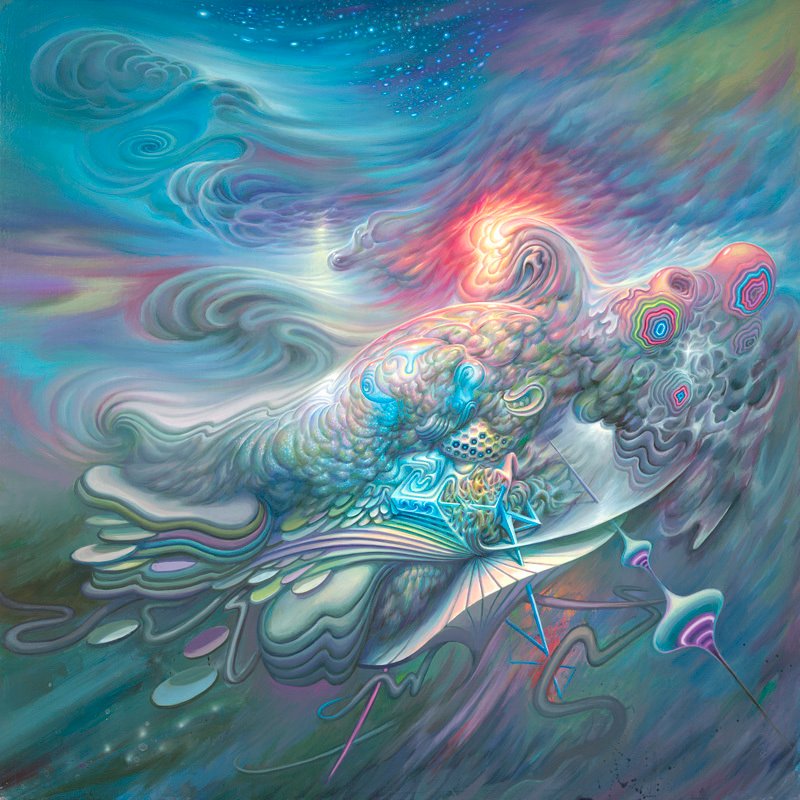
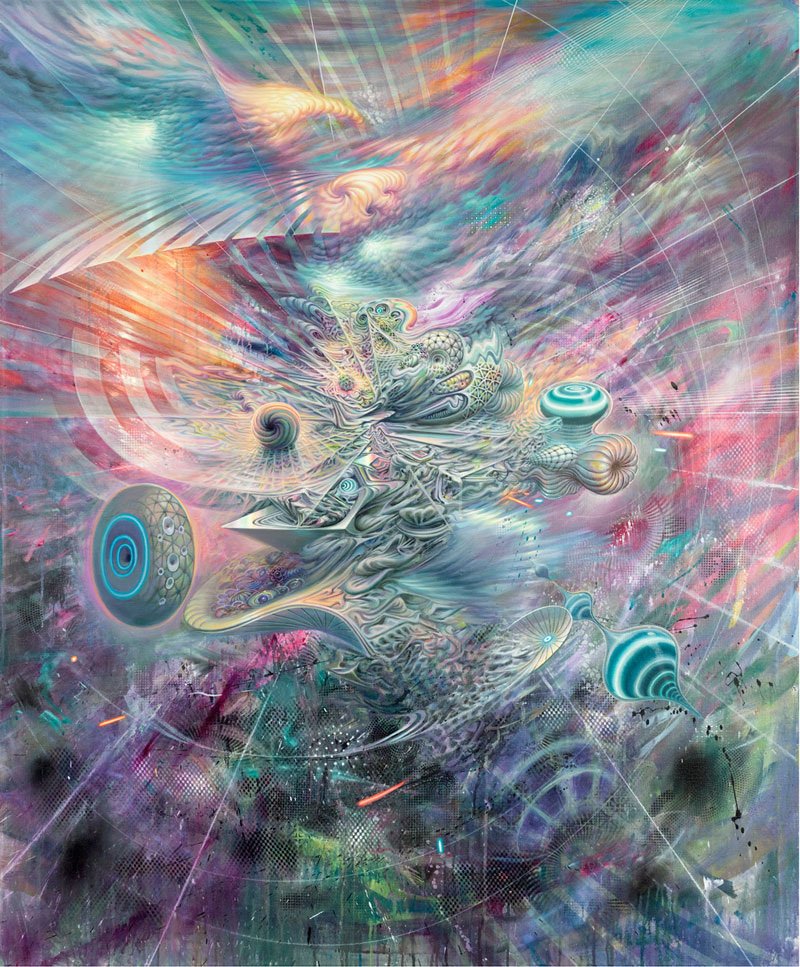
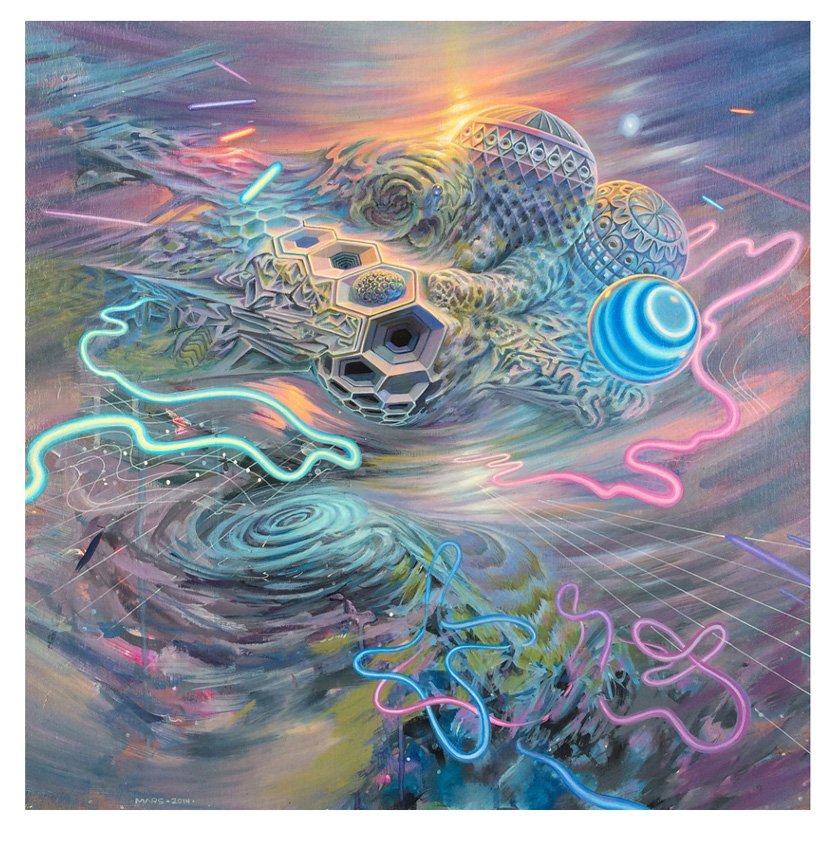

Daniel Mirante
About
Born 1977 in Chester, a Roman city situated on the border of Wales and England. His artistic training includes studying Fine Art at Manchester University qualifying with a Ba Hons. In 2008 he was introduced to mischtechnik methods of painting by Brigid Marlin, and in 2012 worked closely in Vienna, Austria, with the Master painter of Sacred and Visionary Art, Ernst Fuchs.
Daniel Mirante practices as a painter, teacher and writer – who shares with students a wealth of insights into the artist’s craft, and a wide range of research, from metaphor, symbols and allegory to traditional artists methods and materials.
His interest in visionary and sacred art was and continues to be strongly influenced by intensive ceremonial work within indigenous cultures and traditional lineages.
Through exhibiting and lecturing internationally, leading workshops and holding space for collaboration, Mirante has been instrumental in spreading awareness of contemporary Sacred and Visionary Art.
-http://www.danielmirante.com/about/
Works
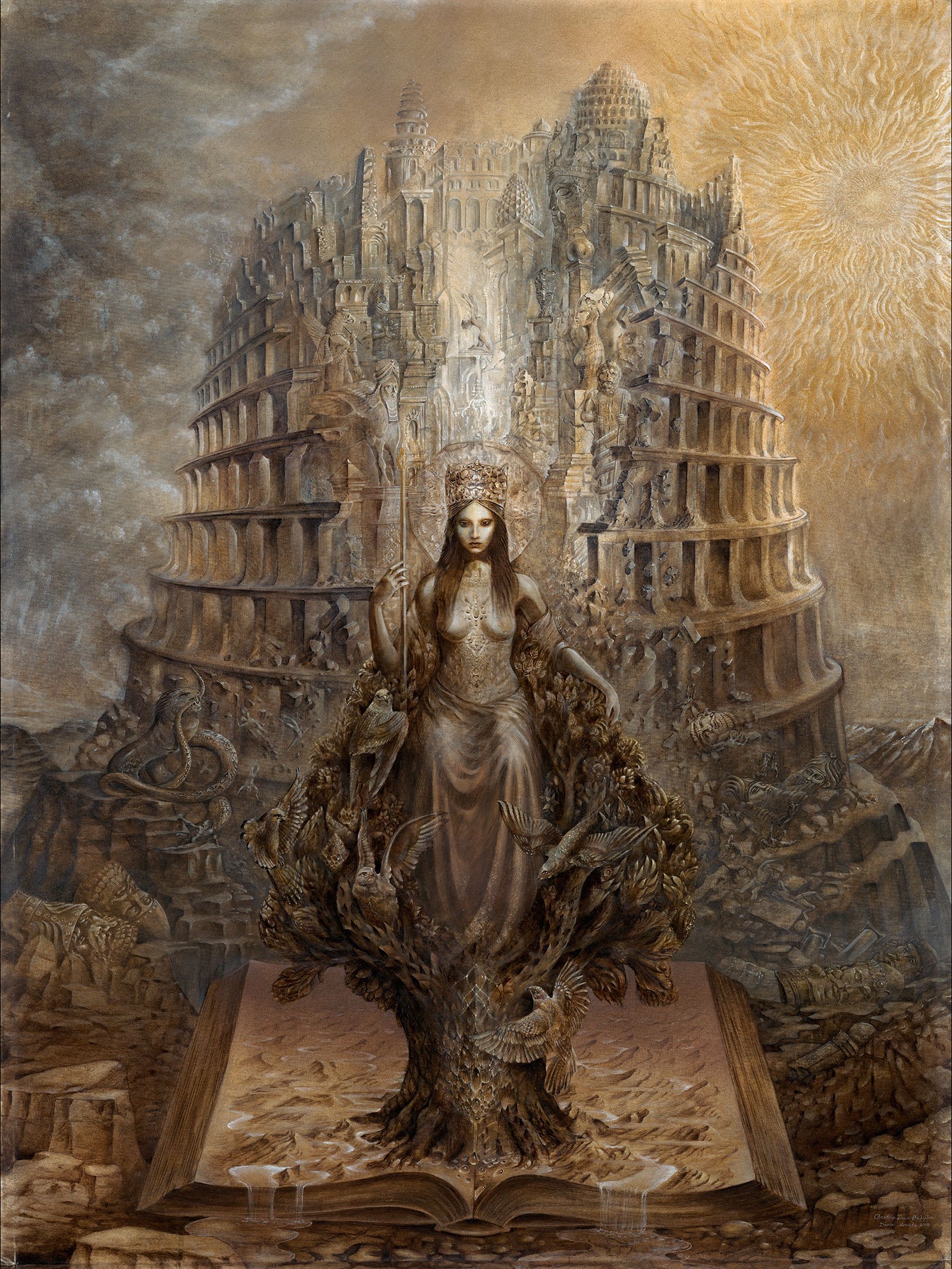
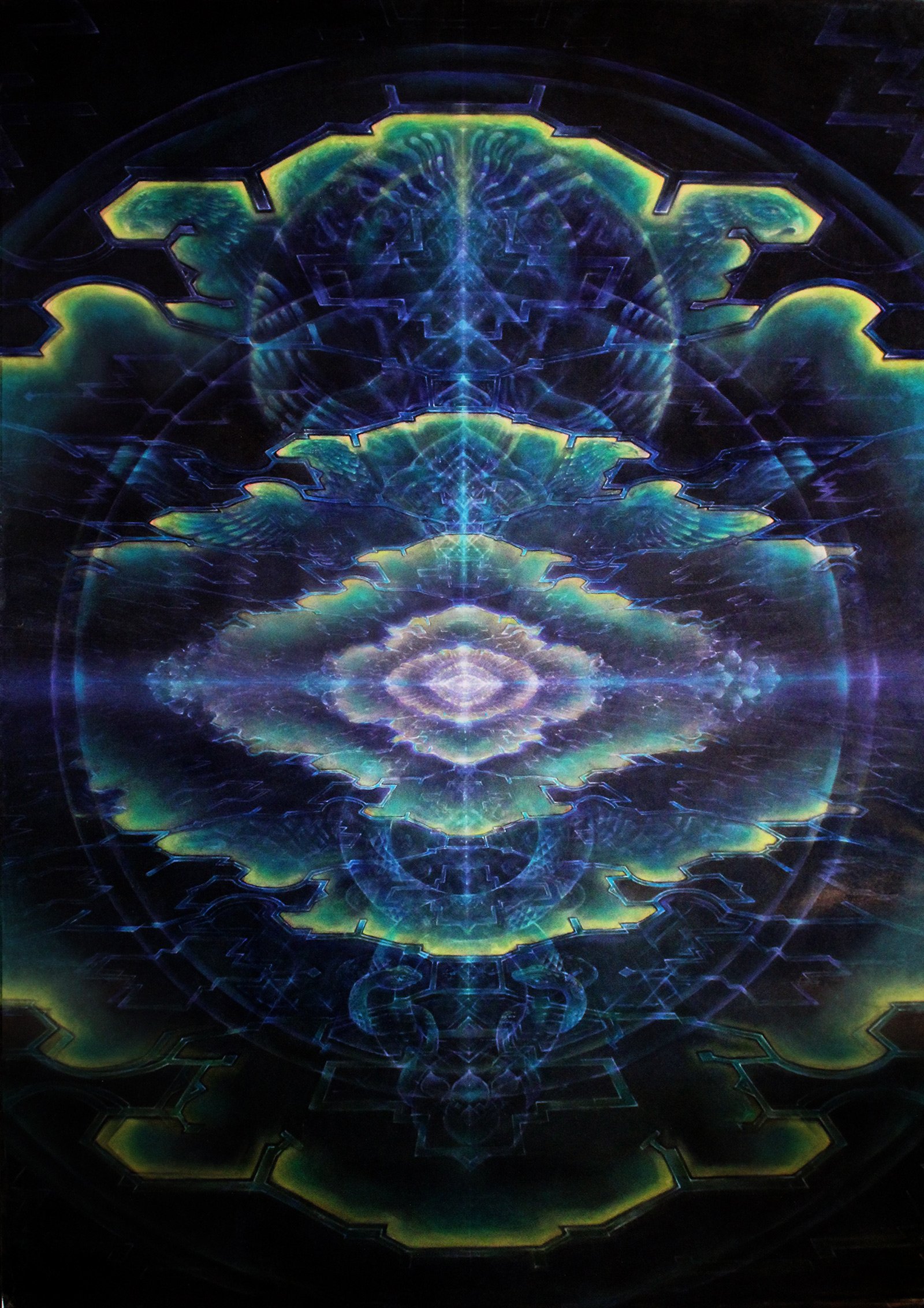
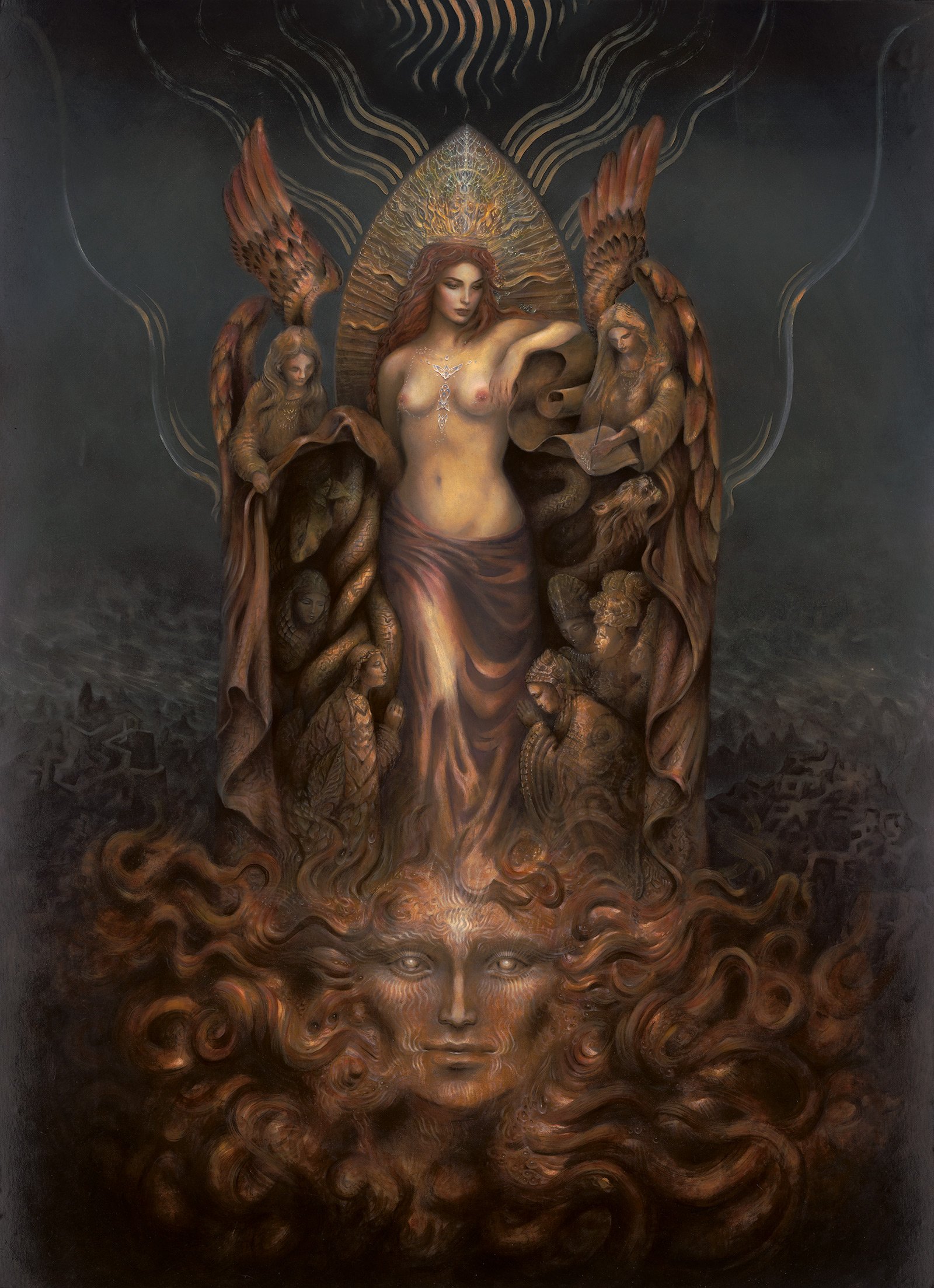

Joshua Mays
http://joshuamaysart.tumblr.com/
About
Joshua Mays is an Oakland-based painter, muralist and illustrator. Born in Denver CO, he studied illustration at Rocky Mountain College of Art and Design and graphic design at Community College of Denver before moving to Philadelphia, where he lived and worked for eight years before exhibiting and traveling nationwide. He has created commissions in Washington DC, Denver, Portland, Philadelphia, Oakland, London, Johannesburg, Mexico City, and Jakarta. - http://www.lunarienne.com/artists/joshua-mays
Works
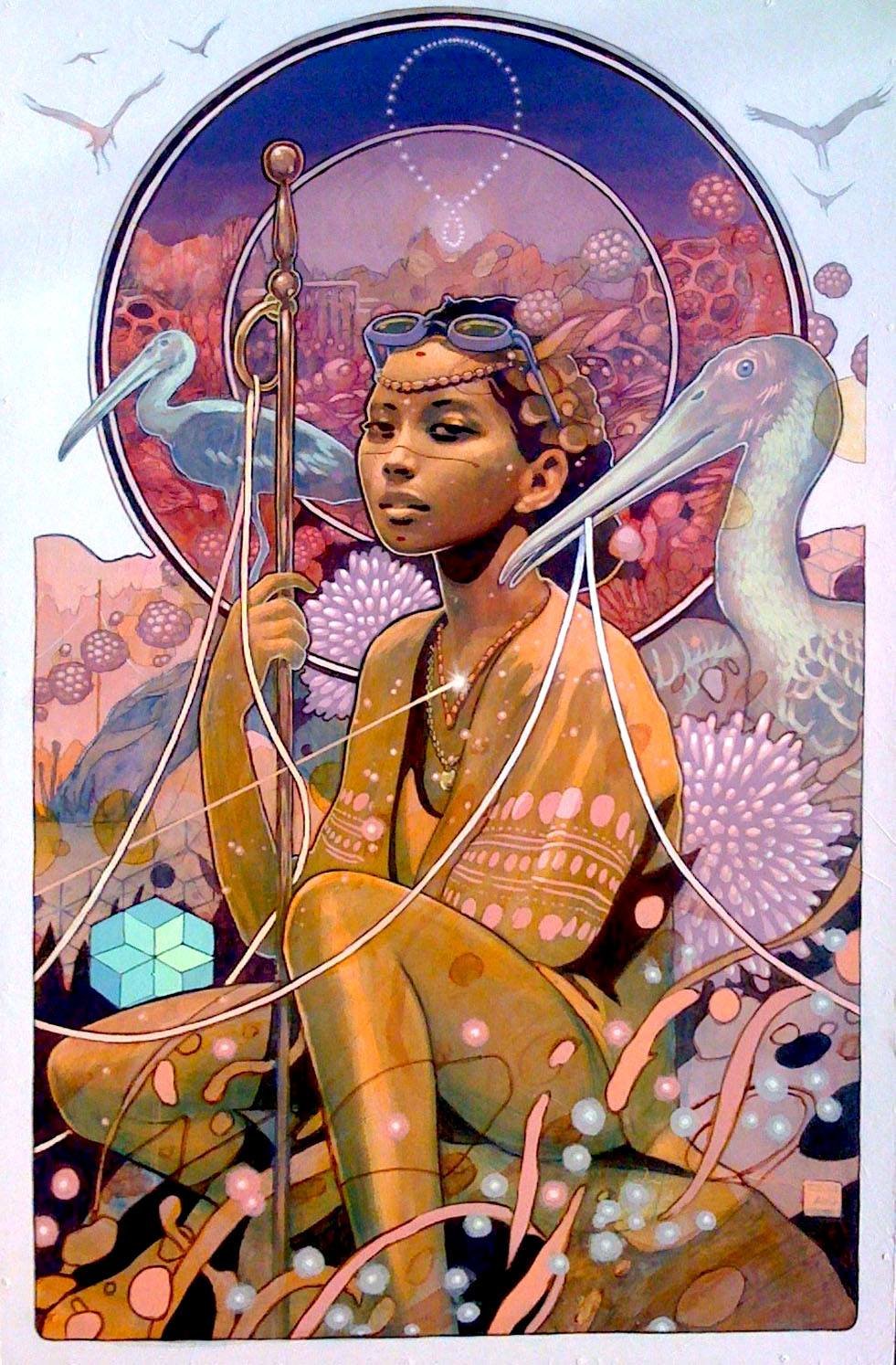
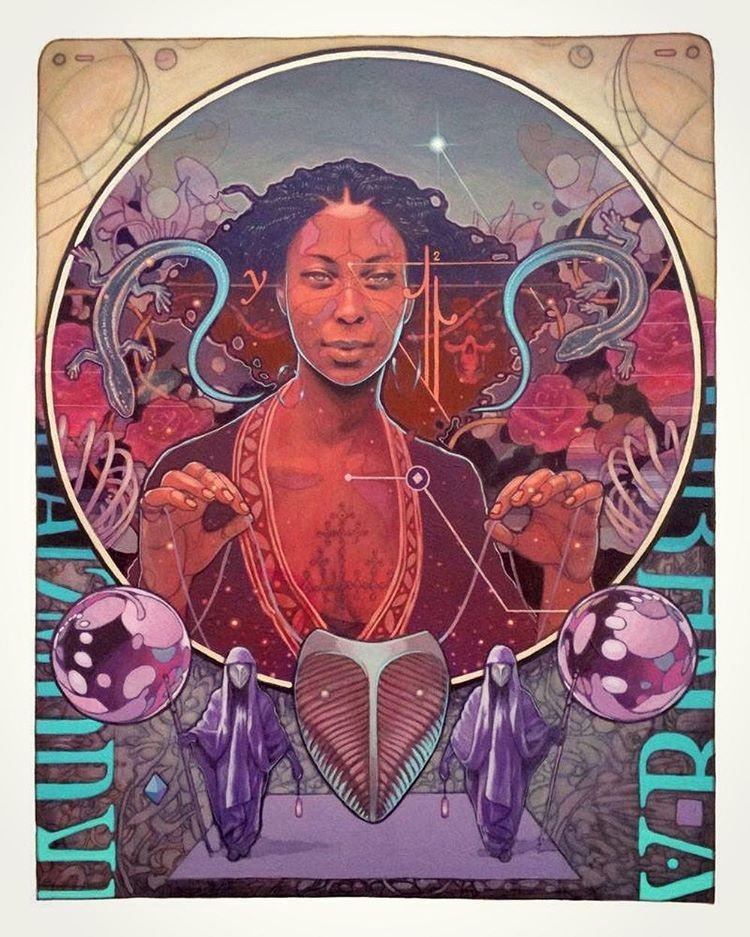
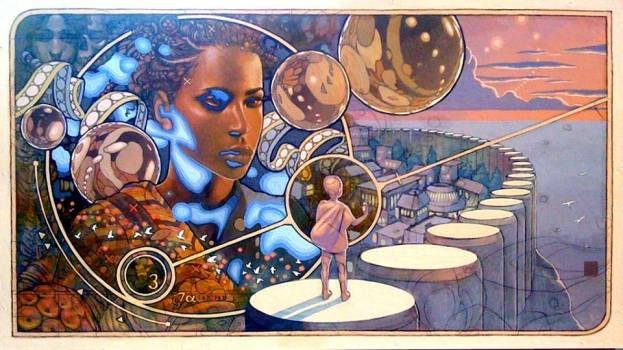

Chris Kuksi
About
The sculpture hangs on the wall: a sprawling world, a warning, a revelation, a vision of a collective soul. From afar, the composition is what is striking, formally balanced, playful yet contained and graceful. It beckons, drawing the viewer into its tangle of meaning, history unfolding in its depths and reverence discovered within the assortment of invented iconography. This sculpture has it all--imagined conquests, sex and death, a hero’s hubris-filled demise, navel gazing and oblivion, tragic characters reliving the mistakes humanity continues to make, the quest, the vision, the warrior, the prophet, the mystic, the child—archetypes that you attach to, project yourself onto, archetypes that litter history and continue to fascinate in different contexts. This sculpture is a whole new framework for something that feels entirely too familiar. The closer the viewer moves, the more entranced they become. The intricate details of the assemblage bring to life the nuances of the narrative, and it becomes clear, that every one of the thousands of pieces within was chosen, plucked from this vast world of material objects, and placed with intention in the context of the sculpture. Though thousands of decisions were made for this one sculpture, they unify in a lucid, baroque harmony.
Kris Kuksi’s process is entirely his own. It starts with the spark of an idea usually encountered in the early hours of the morning when the work is humming, some flotsam rising up from his rich personal history, usually something iconoclastic, earnest, and loaded with paradox. He’ll catch a glimpse and the image will burn itself into his mind long enough for him to bring it into existence.
The painstakingly gathered model kit pieces, injection molded orphans, bric-a-brac and knick knacks, figurines, jewelry and plastic animals congeal into a re-imagined frieze, a macabre amalgam, that reveals, confronts, and provokes a viewer’s belief system by reimagining familiar narratives into new contexts.
Ironic, a man deconstructing and reassembling iconography would work out of a repurposed, late 19th century church, but his studio spans the entire floor plan of just such a building across the Kansas River in a post-industrial corner of Lawrence, Kansas. Surrounded by the patina of old machinery and looming silos, it might just be appropriate that the majority of Kuksi’s process happens here. From foraging the depths of the internet for the perfect model components, to composing thoughtful and complex juxtapositions, all the way through the assemblage, priming, coating, and texturing the myriad pieces, Kuksi spends hours contemplating and executing a sculpture.
This process has not come easy for Kris Kuksi; he puts in the time and the work and has since a young age. Born in 1973 in Springfield, Missouri, he subsequently moved away from his father who struggled with alcoholism to a socially isolated childhood north of Wichita, Kansas. With a mother busy working to support her family and two brothers over a decade older than him, Kris’ creativity was encouraged by his grandmother who shared her stationery in order for him to keep his imagination alive through drawing. With the overwhelmingly muted environment of the Midwest and the isolation caused by his mother’s social phobia, Kris began to develop a rich, interior tapestry of fantasy and creativity. LEGO’s mixed with rural detritus, action heroes with agrarian discards, to bring to life the invented imagery of his mind.
A propensity for drawing and painting in high school and the support of an encouraging art teacher pushed Kuksi to complete both bachelor’s and master’s degrees in painting from Fort Hays State University. His early painting ranged from gestural portraiture a la Caravaggio to more psychedelic and visceral work, reminiscent of Hieronymus Bosch and H.R. Giger. The latter two influences would find their way into his sculpture but this would take some time. “My early paintings and mixed-media assemblages represent the apex of the discovery of myself as an artist. At first, it was hard to accept that I was really a builder and not a painter. If you turn me loose in a museum, I will find where the European sculptures are on the map. Italian Renaissance sculpture is what holds my greatest appreciation and respect—Bernini being my ultimate hero.” After benefitting from several extended workshops focused on the techniques of the old masters in Austria, Germany, and Italy, one of his paintings was accepted into a highly selective exhibition at the Smithsonian’s National Portrait gallery.
The passing of his father coupled with the intensity of his workshop training propelled Kris into new frontiers of meaning and medium. He was inspired and moved to take a risk, wanting to make something of himself with the realization that his destiny was his own--not at all related to his parents mistakes of the past. Following a personal vow to become a successful artist, he began to explore the depths of humanity’s struggles using a new technique of assemblage.
“The function of my work has to do with relating to the darker side of human psychology.”
It is more than his heavily religious upbringing that pushes Kuksi to reinvent iconography. “I enjoy the idea of distorting classical and religious sculpture because it is what mankind has always done. Humans have borrowed gods from other gods. The Romans replaced Greek gods, the Christians replaced Pagan gods, and so on. I just like to create the next step, another parallel reality where I have stolen from classical and religious imagery and created new symbols and idols.
Over the span of Kuksi’s career, his works have been featured in many magazine publications such as Hi Fructose, Juxtapoz, Wild, and many others. Kuksi’s art has attracted many public and private collectors in the United States, Europe, The Middle East and Australia that include individuals such as Mark Parker (Nike CEO), Chris Hardwick (comedian and entertainer), Swizz Beatz and Alicia Keys (musician and producer) Wendy Asher (art collector), Sean Parker (Facebook co-founder), Steve Aoki (DJ), Kay Alden (three time Emmy award winning television writer), Fred Durst (musician and film director), Usher (musician), Chris Weitz (director of The Golden Compass and Twilight: New Moon) Guillermo del Toro (director of Pan’s Labyrinth and Hell Boy 2), Community Dinner Club (Los Angeles), Randal Haworth (plastic surgeon), and Robin Williams (Academy Award and Golden Globe winning actor). Kris has also collaborated with other individuals and companies such as Saatchi Art, Nike, Cosmopolitan Hotel (Las Vegas), The Mortal Instruments: City of Bones (motion picture), Visionaire (publication by Givenchy), Iris van Herpen (fashion designer), and Tibet (benefit auction). He is represented by Joshua Liner Gallery in New York and Mark Moore Gallery in Los Angeles. He currently works and lives out of Lawrence, Kansas with his wife and three children. - https://www.kuksi.com/bio
Works
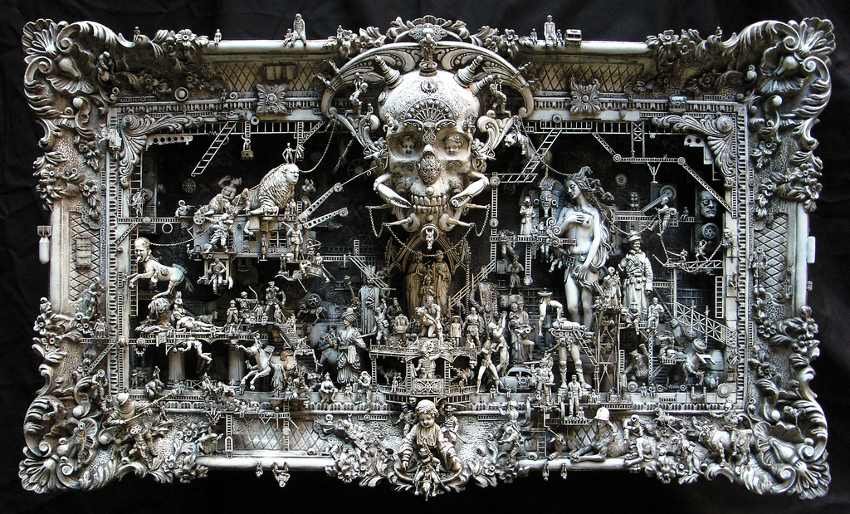
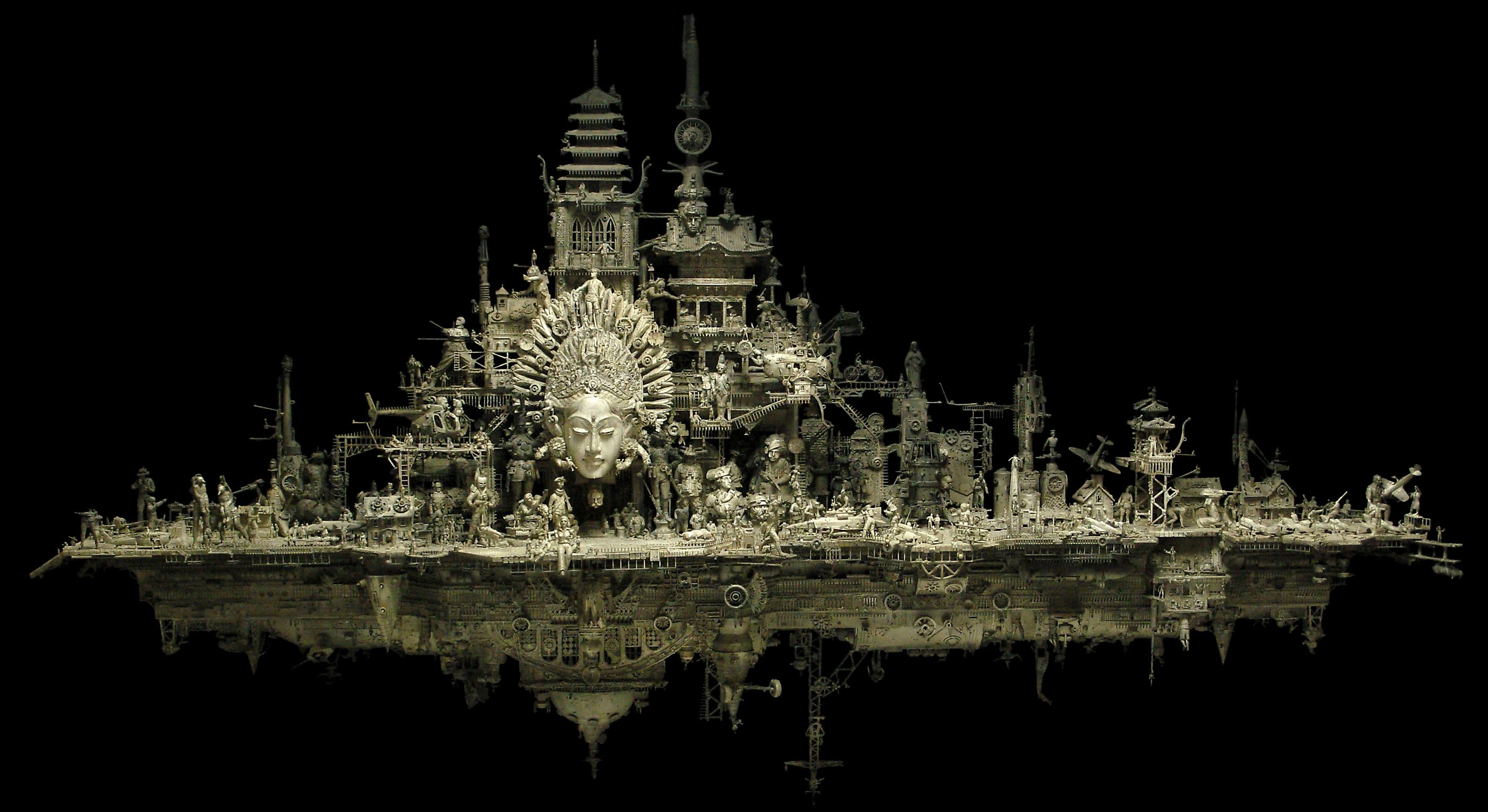
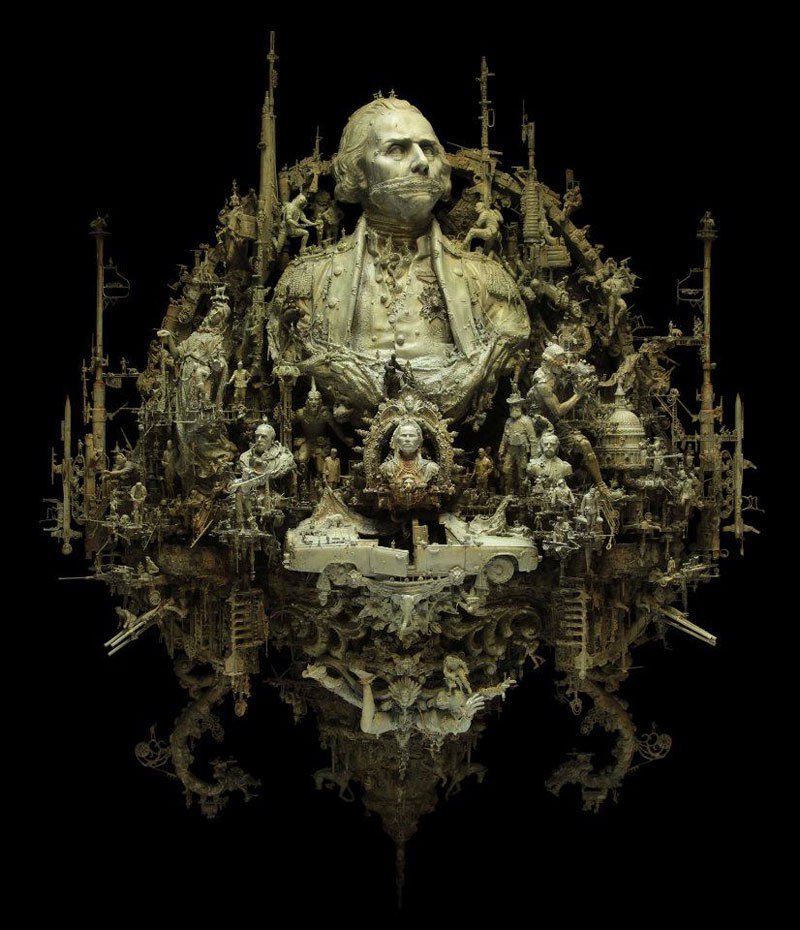

Guy Aitchison
http://www.hyperspacestudios.com/
About
When Guy Aitchison was 16, his sister Hannah approached him from out of the blue and asked him if he felt like going to get tattooed. Guy had never thought about the subject before, indeed had never seen any tattoo work walking around that had made him think anything about tattooing. But the idea immediately appealed very strongly to him. They made an appointment at a grungy local shop for the following week, during which time Guy played around with drawings for the piece. And he had dreams: Dreams of getting tattooed. Of doing tattoos. Of teaching tattooing... of standing on a stage addressing a tattooed crowd. He knew right away that he had found his calling.
After several years as a struggling freelance illustrator, focused mainly on painting album cover designs for low-budget punk and metal bands, Guy finally landed a tattoo apprenticeship at Bob Oslon's Custom Tattooing in October of 1988. The tattoo profession was very closed at the time, with only a tiny handful of shops operating in the entire Chicago metropolitan area. There were ads for tattoo equipment in a few magazines at the time, but Guy was not at all comfortable with the idea of teaching himself something that is in fact a quasi-medical procedure. Being offered that apprenticeship felt to him like being accepted into Harvard, and he embraced the opportunity with all of his energy.
He quickly found that tattooing is an artistic medium with a great deal of flexibility for technical experimentation and personal expression. This ran contrary to what he'd been told by the established tattooers he'd been collecting from, but it made sense, and he was not the only young tattooist arriving on the scene at that moment who was discovering this. Artists such as Aaron Cain, Marcus Pacheco, Eddy Deutsche, Timothy Hoyer, Greg Kulz and Bernie Luther were all trying- and doing amazing things with- new variations on the traditional approach to tattooing.
After only a year at Bob Oslon's shop, Guy was offered his first magazine article, and from that point on made an effort to keep his work in front of the public eye. In two and a half decades he has had countless magazine features and dozens of appearances in fine art books, along with a handful of TV and radio appearances. Currently his efforts are focused mainly online, and in publishing educational and fine art books for the tattoo industry such as Scratch Art, Organica and Innerstate. You can see more of his published material at our online store.
The educational side of Guy's career fell together very naturally, starting with being offered a chance to teach a seminar at one of Dennis Dwyer and J.D. Crowe's Tattoo Tour conventions, which at the time were the gold standard of tattoo expositions. The idea of presenting educational material in a seminar format was revolutionary; previously, tattooists had always protected their information with great suspicion, since the industry was so small and so closed. With the blossoming of tattooing and the influx of new artists, there was room for everyone to grow without stepping on each other's toes. Guy's seminar that weekend was about doing coverup tattoos, and he handed out illustrated 30 page booklets to everyone that attended. As he did different seminars from time to time, he created different new booklets, and inevitably was asked by people who couldn't attend the seminars if they could just buy the books. From this beginning, his books evolved into the massive 368 page Reinventing The Tattoo, which also includes a detailed DVD, as an effort to create the most comprehensive learning package possible.
Much of the tattoo educational process is focused on gaining a full knowledge of the technical matters such as machines and needles. Although Guy does address these subjects, his opinion is that the artistic and compositional end of the process has been grossly underrepresented, and seeks to bring that to the forefront. He feels that a good design can survive a slightly weak execution, while a poor design will look bad no matter how technically perfect it may be. So a good deal of his emphasis is on things like color theory, flow, dynamic composition, depth, lighting, contrast and other more traditional fine art theory, reframed to be as helpful as possible for tattoo artists.
Guy's interest in these subjects is largely because of the types of artistic subject matter he is attracted to, which generally require a finely balanced yet maximalized approach, where all the tricks of depth and lighting are brought into play to bring out a highly dynamic visual experience. His favorite subject matter is abstract, but with a sense of realism applied so the viewer is transported into an alternate reality that they can truly immerse themselves in. Much of this approach came from the unusual collection of artistic influences that Guy absorbed while he was young and soaking things up like a sponge: Max Ernst, Salvador Dali, M.C. Escher, Leonardo Da Vinci, H.R. Giger, Michael Whelan, Derek Riggs and Victor Varsarely. This, along with keen interests in cutting edge science and psychedelic culture, come together into Guy's signature style. - http://www.hyperspacestudios.com/artists/Guy_Aitchison/
Works
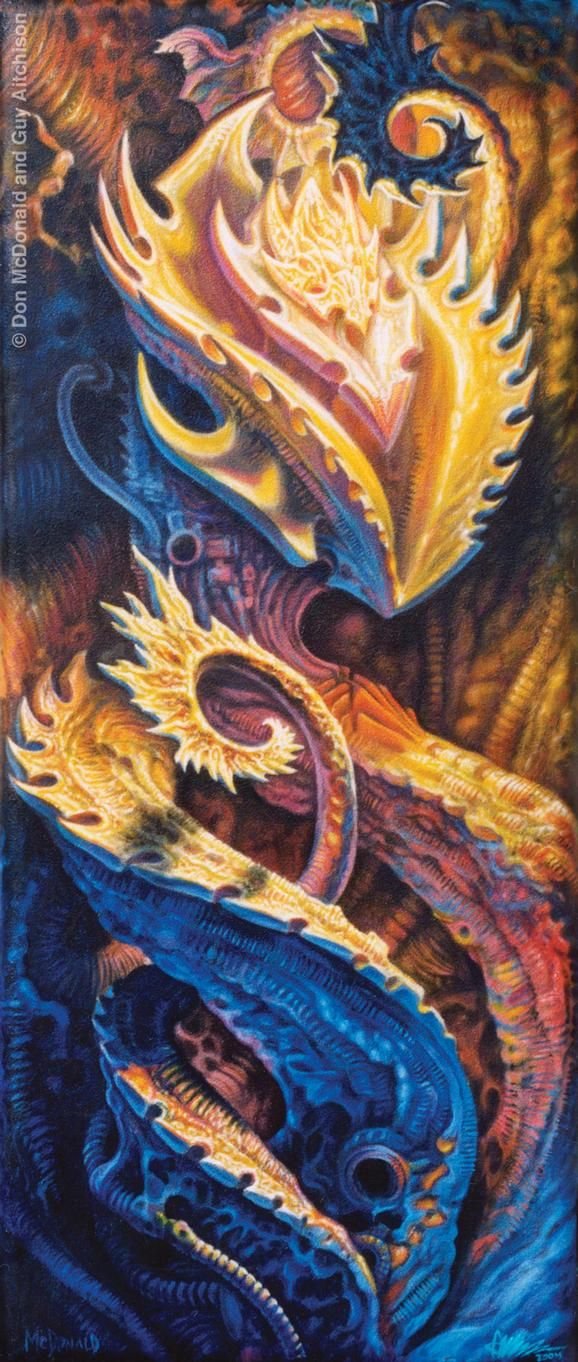
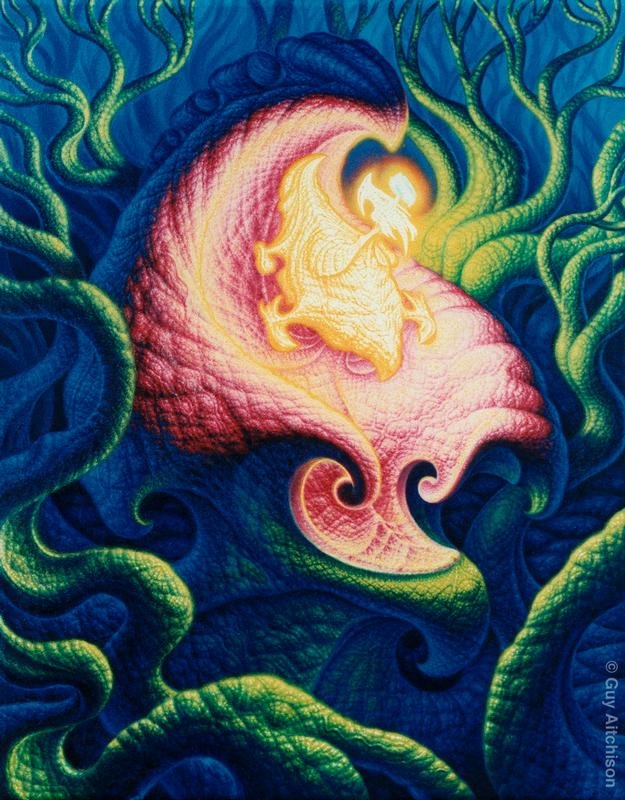
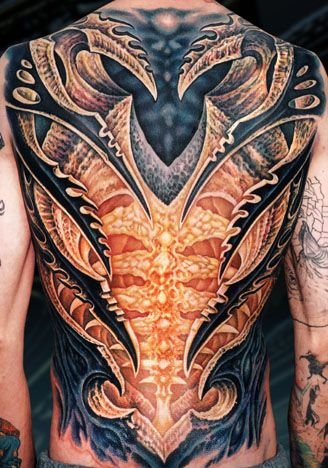

Xavi Panneton
About
ABOUT XAVI
Xavi is an internationally recognized mural Artist and Designer most widely known for his contributions to the global visionary art and festival culture.
“Growing up in the 80’s and 90’s as a skateboarder in the Washington, D.C. metro area, I was exposed to Graffiti Art at a young age. I quickly became obsessed with this almost alien force of art. The dopeness of Graffiti was an intoxicating feeling beyond anything for which I had words. Dynamic letters, colors, shapes and characters came alive in my imagination, hypnotically pulling me toward some future destiny. I knew that this was my calling in life. In order to feed my obsession, and being that I was so young, my parents bought me an airbrush and I began painting murals. Soon, I was painting murals in kids’ bedrooms, at my high school and in local businesses. I started airbrushing graffiti t-shirts, jeans, backpacks and whatever anyone wanted me to paint. Ever since then, I have worked full time making art and building a career … one creation at a time. Since the 90’s, the rave scene and West Coast festival culture have given me a space to share and grow culture & community. Everyday I feel humbled that I am able to participate in making art with the intention of bringing light and making the world a sweeter place.” -https://shop.xavidesigns.com/pages/about-us
Works
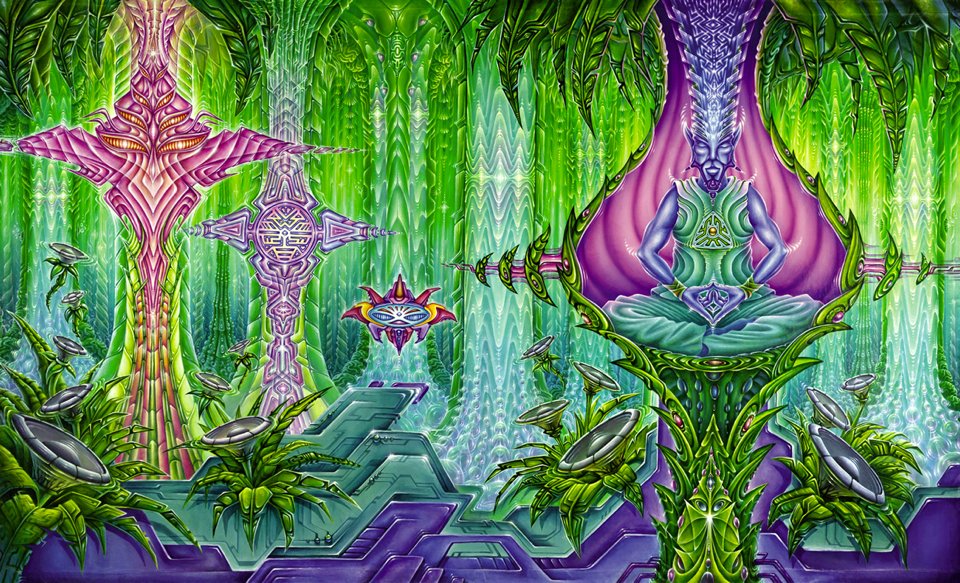
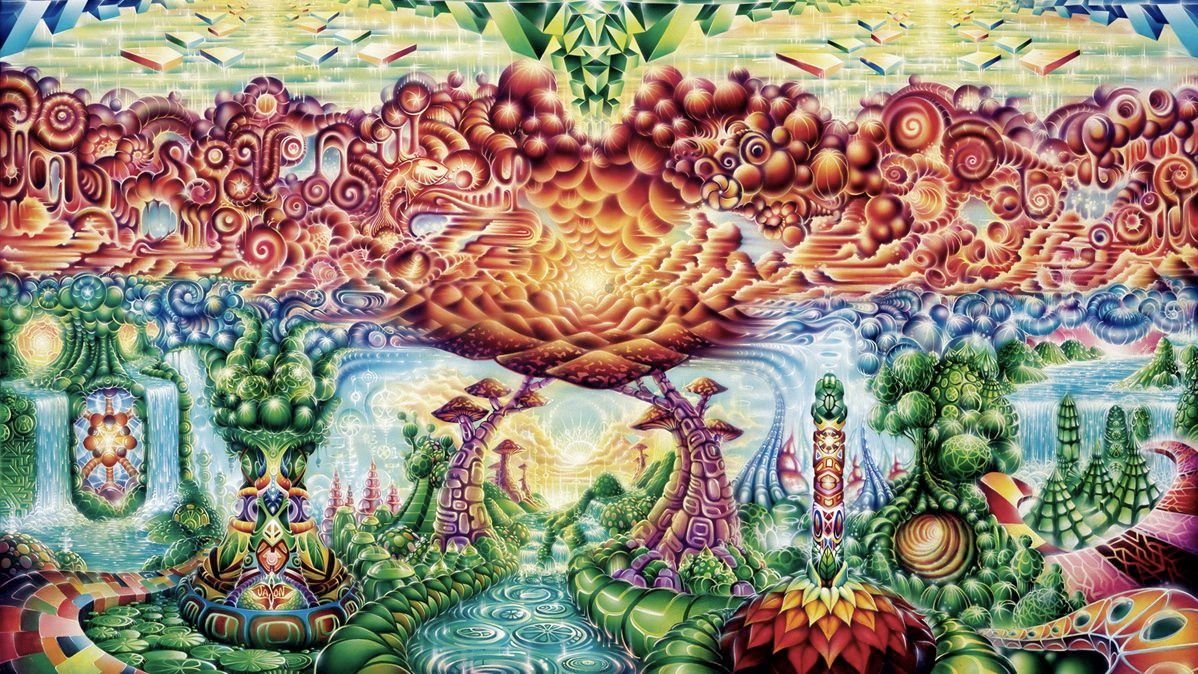
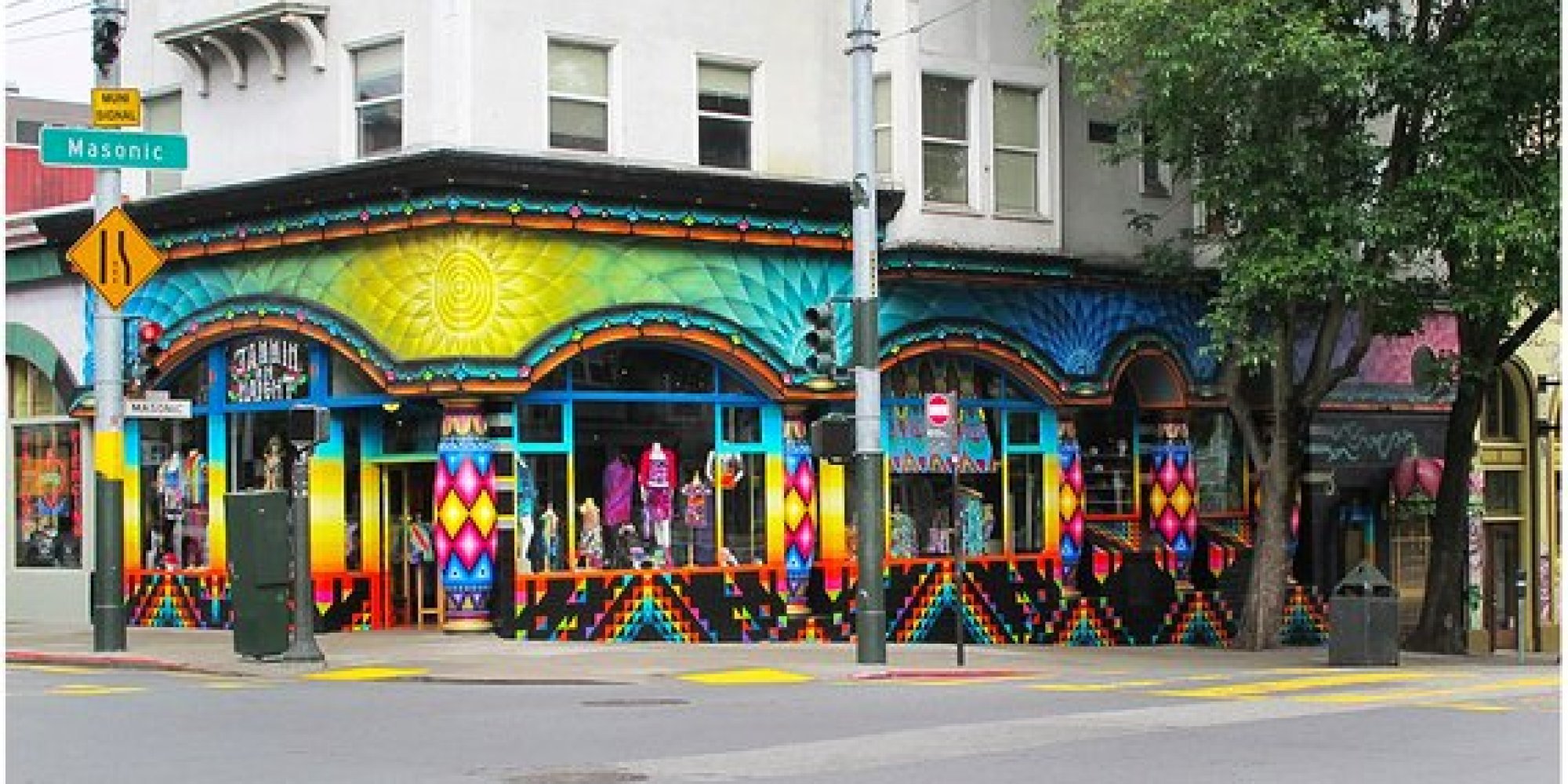

Jake Kobrin
https://www.facebook.com/jkobrinart/
@jkobrinart
About
Jake Kobrin was born in San Francisco and raised in Mill Valley, California. Met with the striking natural beauty, and cultural vacancy of Mill Valley, Jake immersed himself in an inner world of his own creation. During his youth and throughout his adolescence, his artwork was his sanctuary, and during that period of hermit-like dedication he fostered a passion for visual art that has only grown throughout his life. After high school, a series of entheogenic and meditation experiences triggered a lifelong pursuit of spiritual Truth. He currently resides in Marin county and continues to create artwork in a variety of mediums ranging from acrylic, oil, digital paintings, and graphite drawings.
On his artwork, Jake reflects:
“My artwork strives to revitalize the medium of visual art as a spiritual tool to communicate to the viewer a rich inner world that is accessible to all. In this way my artwork serves as a sacred mirror, a vehicle of self discovery for both the artist in the process of creation and for the viewer as a reflection of a numinous and uncharted aspect of the psyche. My artwork manifests almost entirely from a subconscious place, influenced by the automatist techniques of the great surrealists. My artwork is also greatly influenced by non-ordinary, shamanic, and transpersonal experiences, Eastern philosophy and psychology, the thriving psychedelic avant-garde of Burning Man, and the burgeoning Visionary counter-culture. I strive to blend an eclectic array of artistic and cultural influences with a classically-informed aesthetic to produce artworks that are both visually and conceptually interesting.” - https://ravenectar.com/collections/jake-kobrin
Works
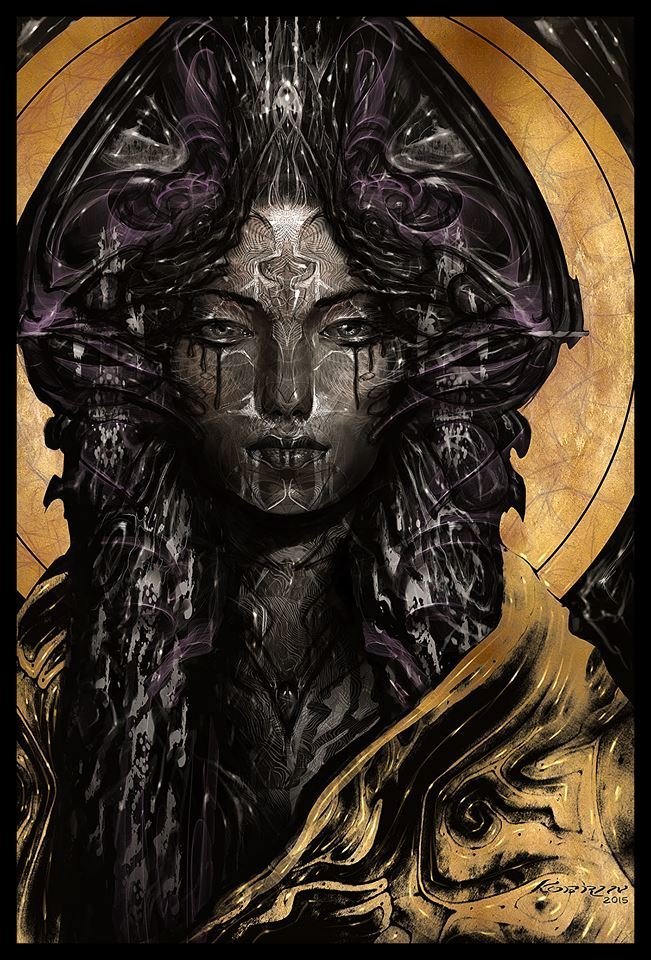
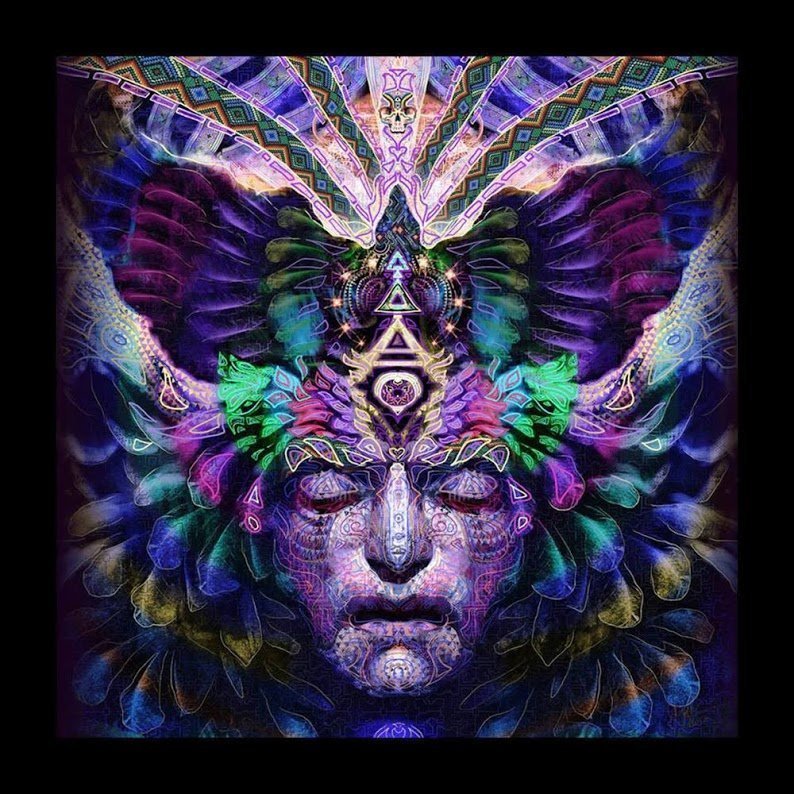
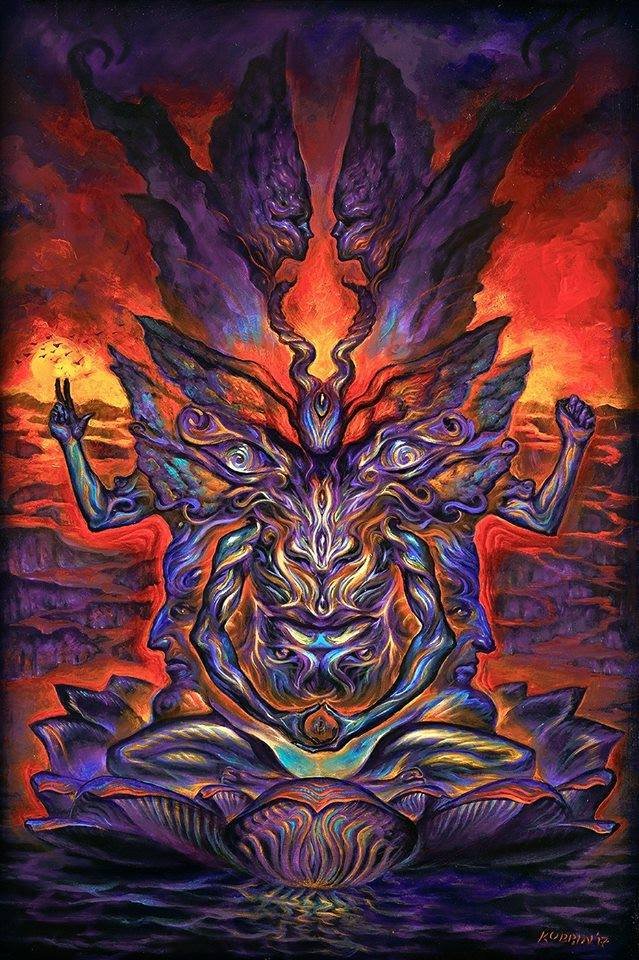

Somnio8 - Mark Lee
About
Works
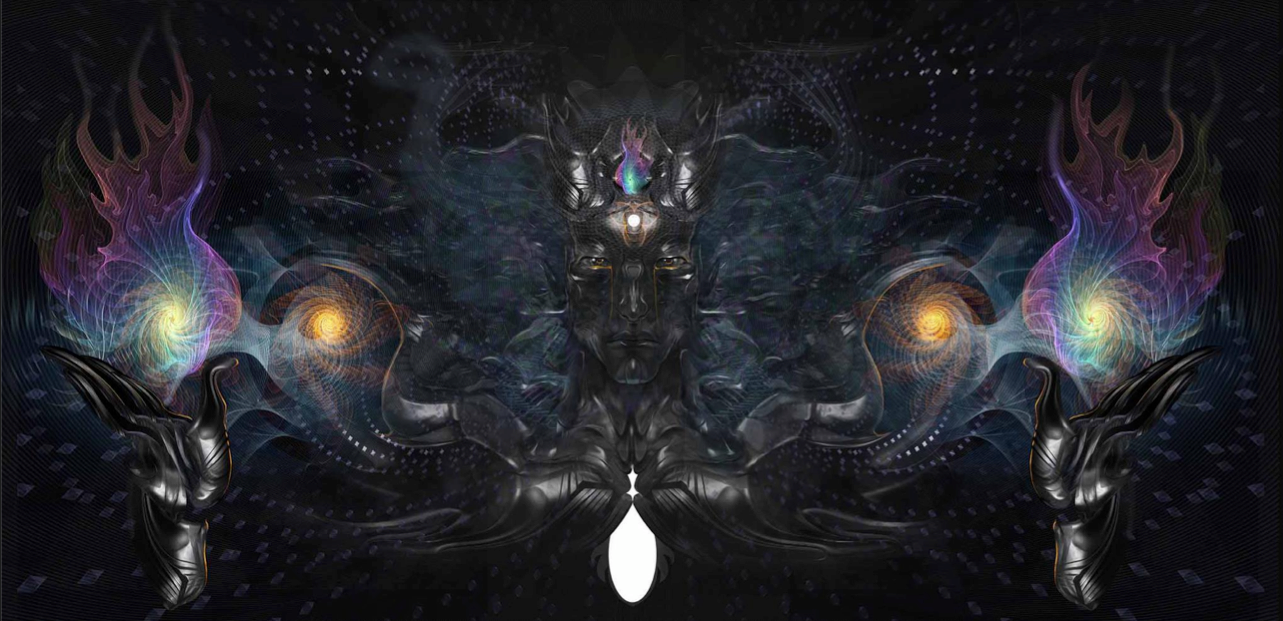
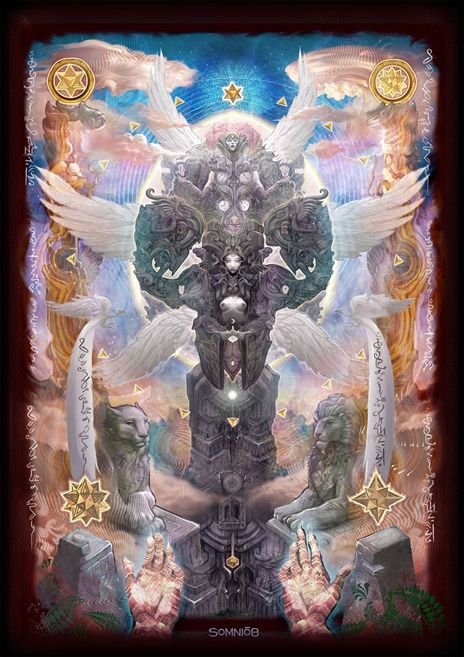
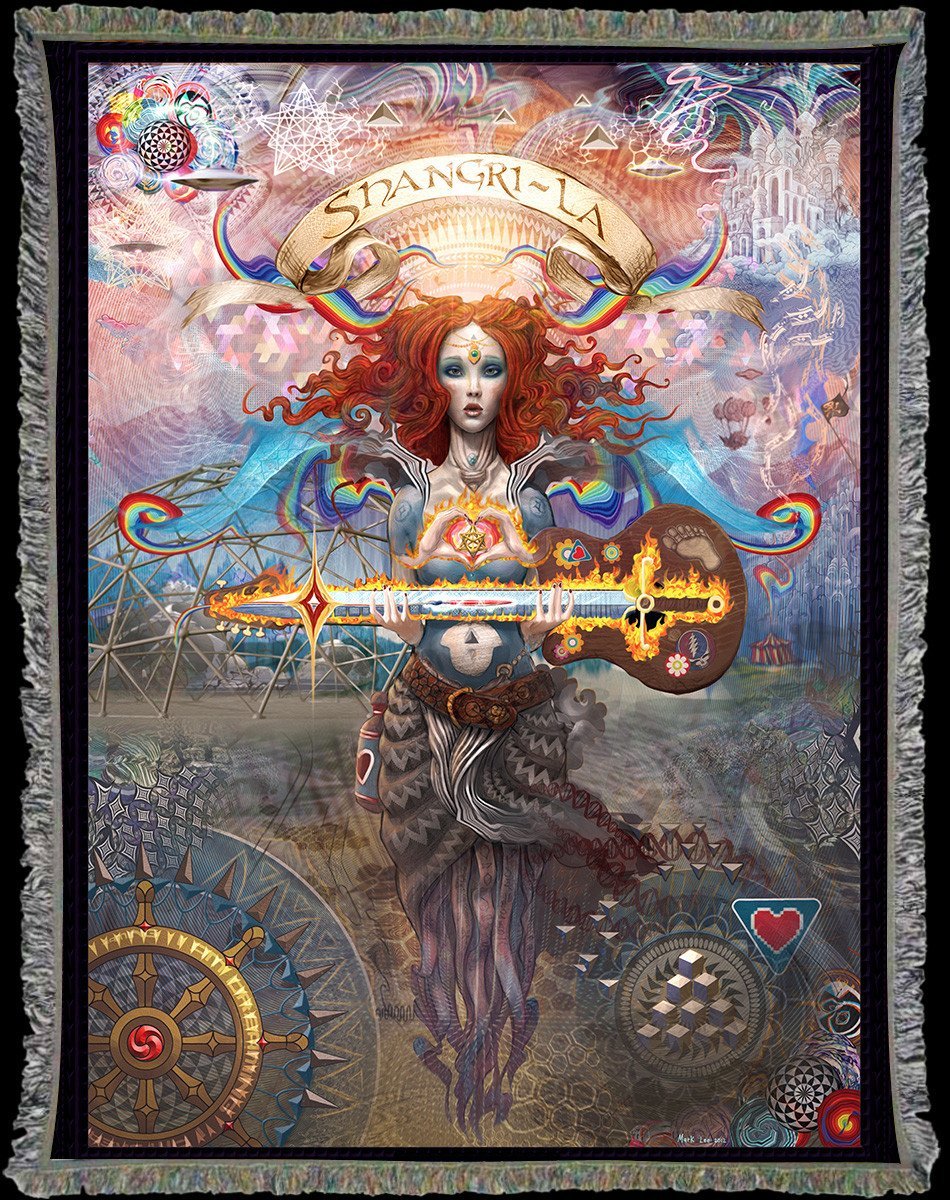

Peter Mohrbacher
About
Pete is an independent illustrator and concept artist living in the Chicago area. He works full-time on his creator owned project Angelarium. He's also known for a 3 year stint working on Magic: The Gathering where his art and designs were used prominently through the Return to Ravnica and Theros sets. - https://www.vandalhigh.com/about-me/
Works
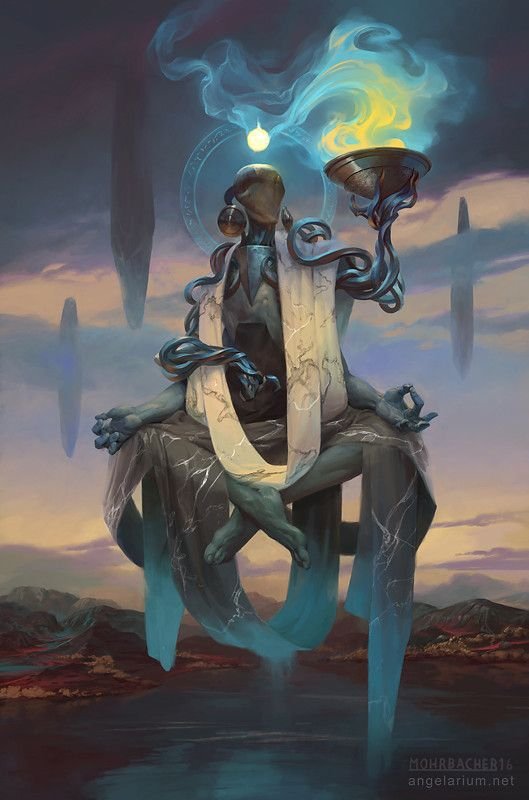
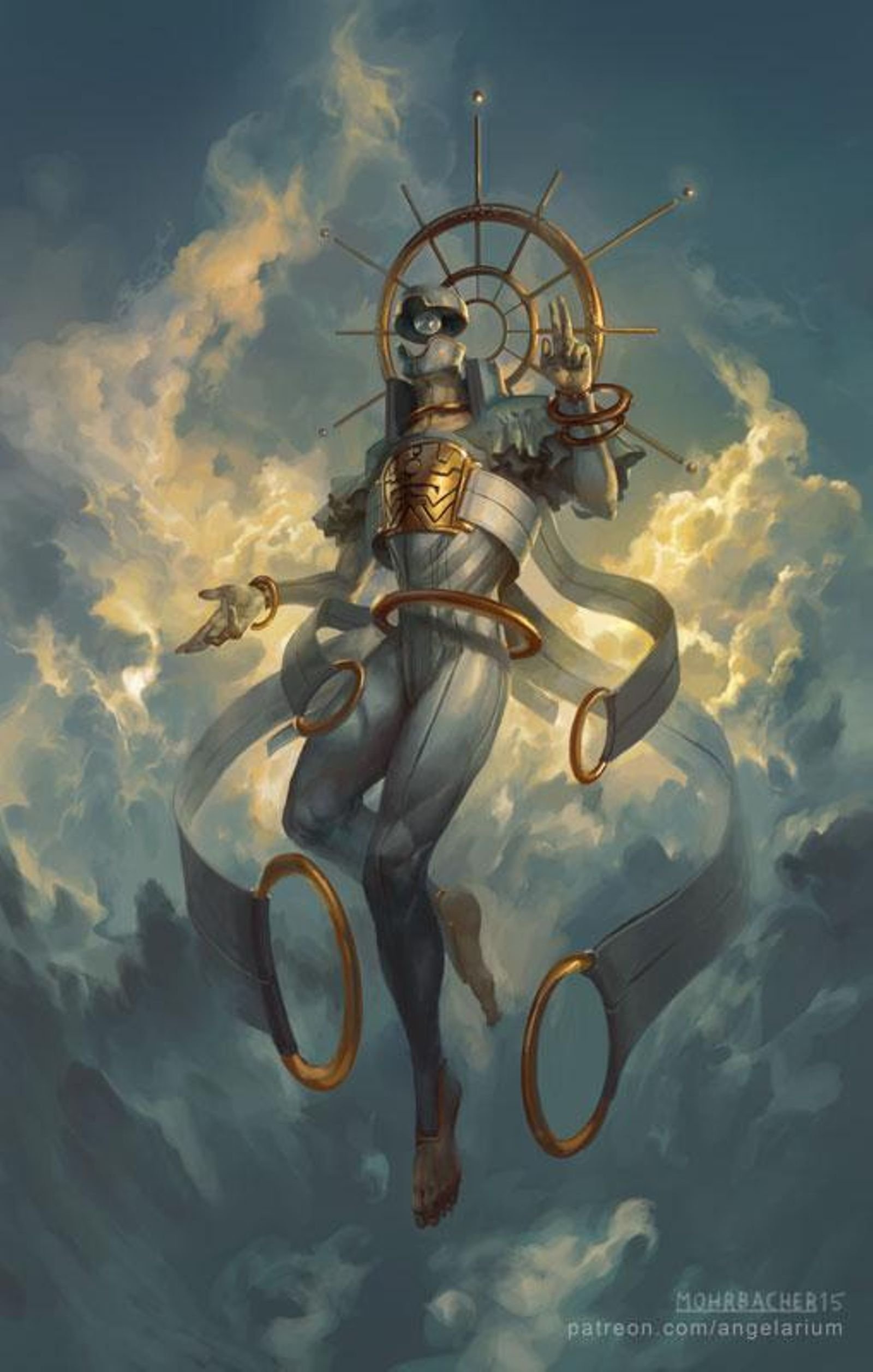
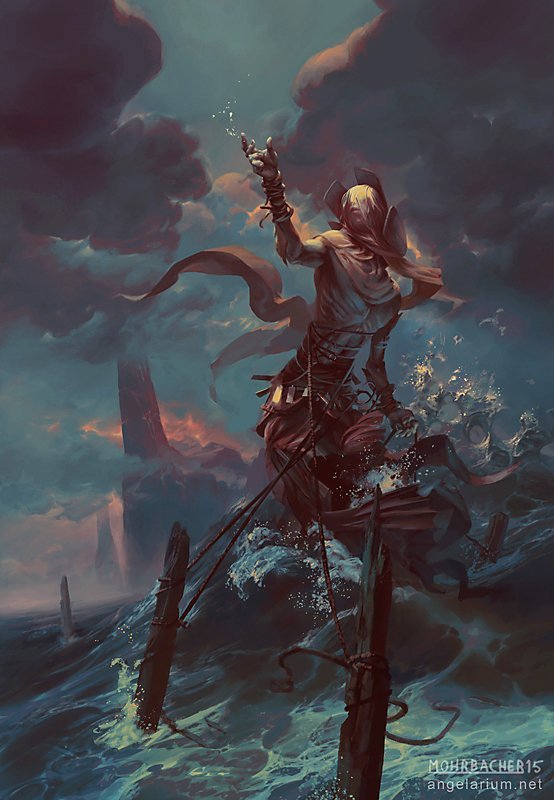

Ben Ridgeway
About
With his work, university professor and artist Ben Ridgway invites viewers to make personal connections to the audio and visual without relying on narrative or spoken language. His animations are hypnotic explorations of nature and mechanics that take viewers on a journey that is hard to describe. - https://www.buzzworthy.com/ben-ridgways-animations-are-the-closest-thing-to-a-lsd-experience/
Works
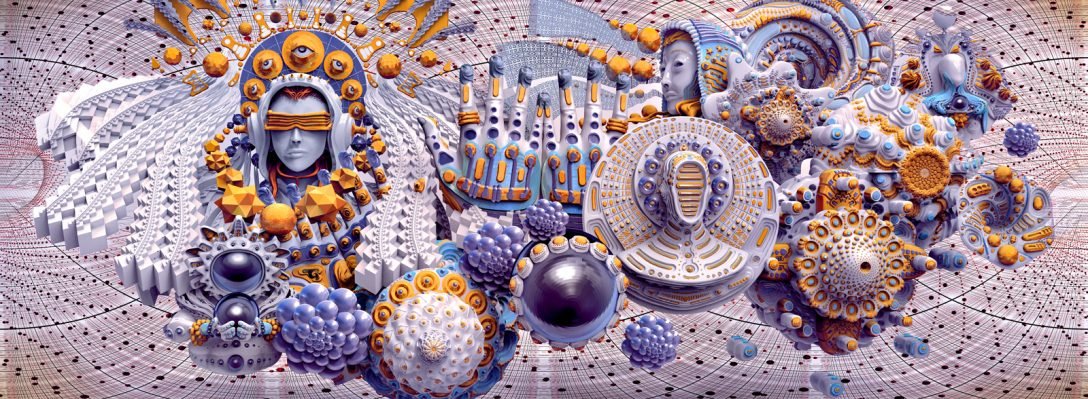
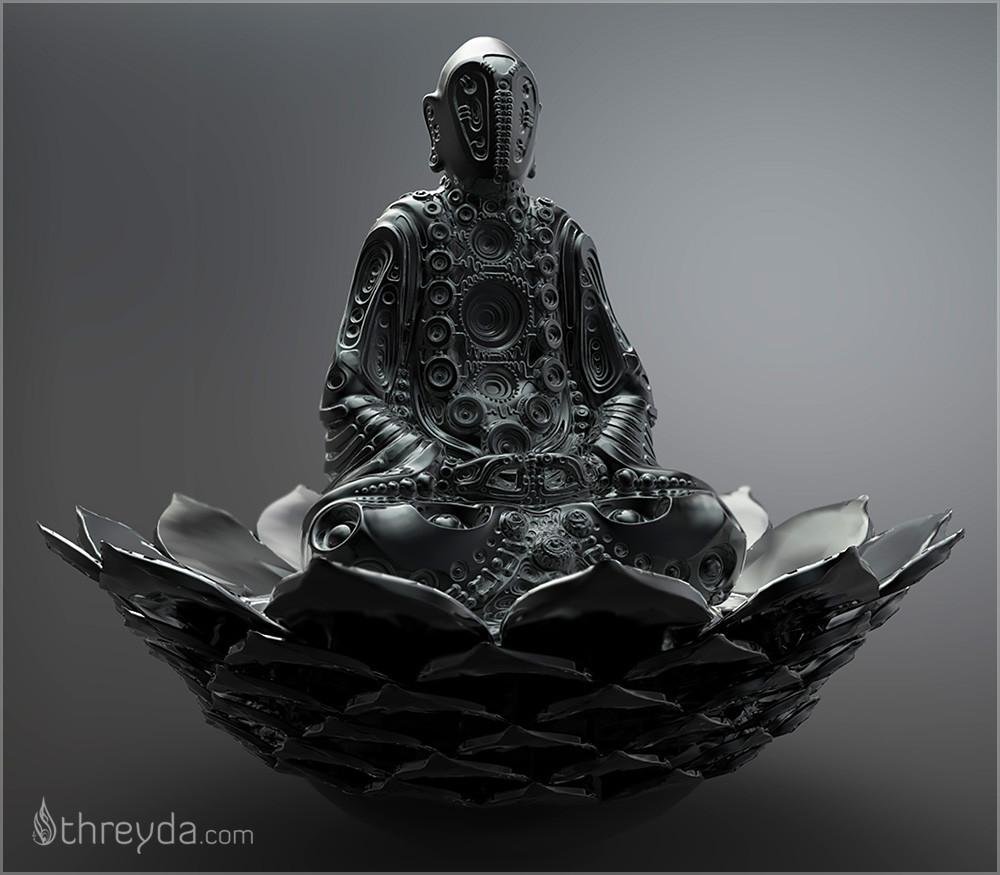
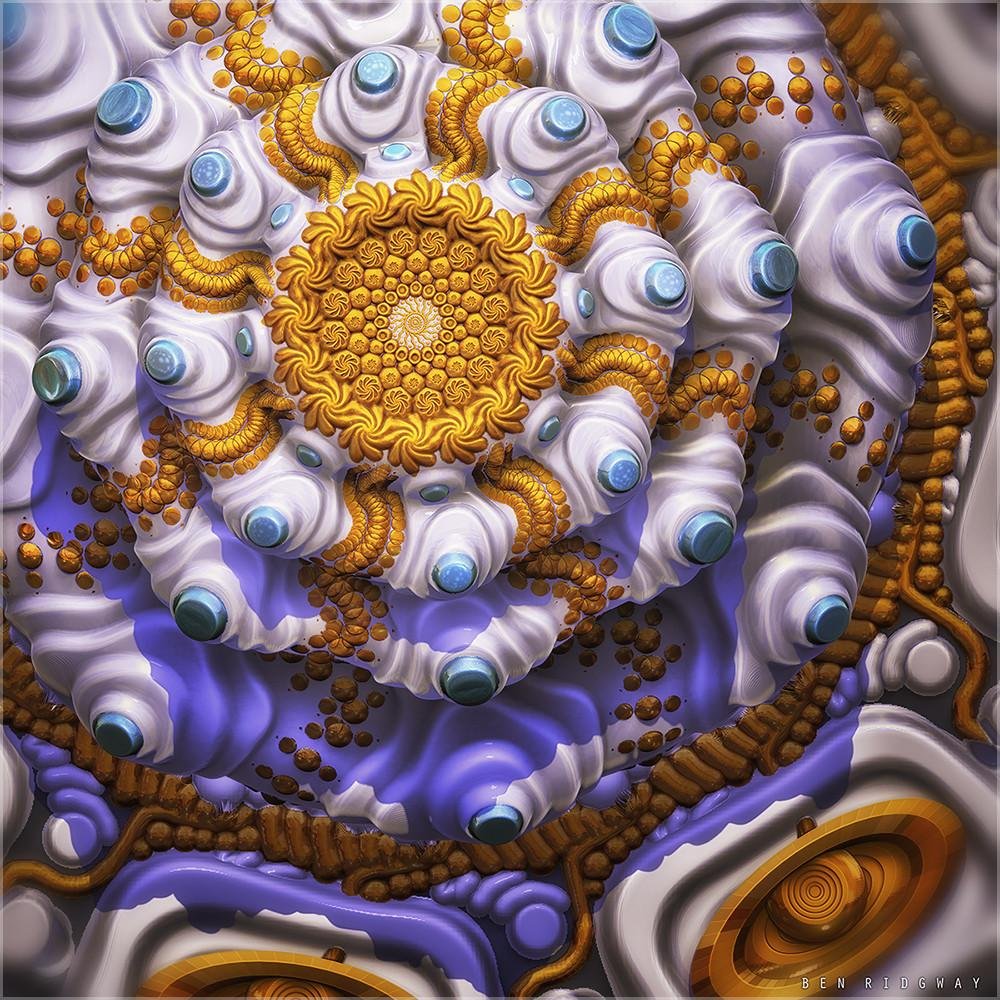
And That Concludes Part 2 of our Exploration of Visionary Art

Thanks for paying attention and check out Part 1 here
@elohprojects/new-rennaissance-10-unbelievable-artists-you-ve-never-heard-of-part-1
You may also view solid breakdowns of my own Visionary Pieces here
@elohprojects/the-leap-the-stoned-ape-theory-and-psilocybin-s-impact-on-creativity
and here
@elohprojects/astralship-future-legends-flagship-image-release-a-beat-by-beat-explanation
And see all of my work at https://elohprojects.com/
Thank you for your kind support. Please Follow Resteem and Upvote:)

